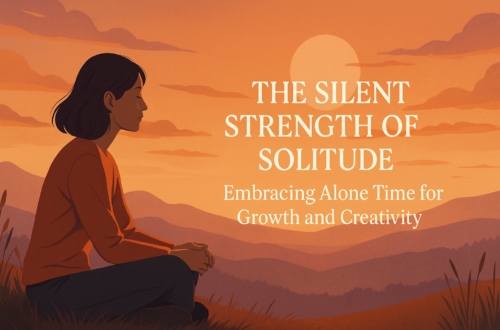In a world saturated with carefully curated social media feeds and relentless societal expectations, the pursuit of “success” can feel like an endless, exhausting race. We’re constantly bombarded with images of material wealth, professional accolades, and flawless lifestyles, leading us to believe that success is a singular, universally defined destination. But what if we’ve been looking at it all wrong? What if true success lies not in conforming to external standards, but in courageously crafting our own unique yardstick?
The Illusion of Societal Success

The societal definition of success is often presented as a monolithic, universally desirable goal. It’s a narrative woven into our culture, reinforced by media, advertising, and even well-meaning family members. However, this narrative is often a carefully constructed illusion, a mirage that promises fulfillment but often delivers a hollow echo.
Here’s a breakdown of the key elements of this illusion and why they fall short:
1. Financial Prosperity: The Golden Cage
- The Myth: More money equals more happiness and security.
- The Reality: While financial stability is essential for basic needs, excessive focus on wealth accumulation can lead to:
- Hedonic Adaptation: The tendency to quickly return to a baseline level of happiness, regardless of significant positive events (like getting a raise).
- Workaholism: Sacrificing personal relationships and well-being for financial gain.
- Fear of Loss: Constant anxiety about losing wealth or status.
- Materialism: An unhealthy obsession with acquiring possessions, leading to a cycle of wanting more.
- Lack of purpose: if all of your focus is on making money, other important aspects of life may be ignored.
- The Deeper Issue: Money is a tool, not a destination. It’s how we use it to support our values and create meaningful experiences that truly matters.
2. Career Advancement: The Ladder to Nowhere
- The Myth: Climbing the corporate ladder or achieving prestigious titles signifies success and fulfillment.
- The Reality:
- Job Dissatisfaction: Many people find themselves in high-powered positions that offer little personal satisfaction.
- Burnout and Stress: The pressure to perform and compete can lead to chronic stress and burnout.
- Lack of Work-Life Balance: Sacrificing personal time and relationships for career advancement.
- The “wrong ladder” problem: the person may be very good at climbing a ladder that they should have never been on in the first place.
- The Deeper Issue: True career success lies in finding work that aligns with our passions and values, not just titles and salaries.
3. Material Possessions: The Empty Shell
- The Myth: Owning luxury goods and a large house signifies wealth and status, leading to happiness.
- The Reality:
- Consumerism Trap: The constant desire for more possessions leads to a cycle of debt and dissatisfaction.
- Superficial Validation: Seeking validation from others through material possessions is fleeting and ultimately unfulfilling.
- Environmental Impact: Excessive consumption contributes to environmental degradation.
- Maintenance: More stuff means more upkeep and responsibility.
- The Deeper Issue: True wealth lies in experiences, relationships, and personal growth, not material possessions.
4. Social Status: The Fragile Crown
- The Myth: Achieving fame, recognition, and a large social network signifies success and acceptance.
- The Reality:
- Superficial Relationships: Social status often leads to shallow and transactional relationships.
- Fear of Judgment: Constant anxiety about maintaining a certain image and avoiding criticism.
- Privacy Invasion: Public figures often sacrifice their privacy and personal lives.
- Social media pressure: the need to have a certain amount of followers, or likes can be extremely taxing.
- The Deeper Issue: True connection comes from authentic relationships built on mutual respect and shared values.
5. Physical Appearance: The Unattainable Ideal
- The Myth: Adhering to conventional beauty standards and maintaining a youthful appearance signifies success and desirability.
- The Reality:
- Body Image Issues: Constant exposure to unrealistic beauty standards leads to body dissatisfaction and self-esteem issues.
- Ageism: Fear of aging and the pressure to maintain a youthful appearance.
- Superficial Validation: Seeking validation through physical appearance is fleeting and ultimately unfulfilling.
- Unrealistic standards: the beauty standards presented in media are often digitally altered, and unattainable for most people.
- The Deeper Issue: True beauty lies in self-acceptance, confidence, and inner strength.
Why This Illusion Persists:
- Cultural Conditioning: We’re bombarded with messages from a young age that reinforce these societal norms.
- Social Comparison: We constantly compare ourselves to others, leading to feelings of inadequacy.
- Fear of Missing Out (FOMO): The fear of being left behind or missing out on opportunities.
- Marketing and Advertising: Companies exploit our insecurities and desires to sell products and services.
- Lack of alternative models: many people have not been exposed to other ways of defining a successful life.
The Toll of External Validation

The human desire for acceptance and approval is deeply ingrained. We naturally crave recognition and validation from others. However, when this desire becomes an insatiable need, it can lead to a host of negative consequences. Relying heavily on external validation can create a fragile sense of self-worth, dependent on the ever-shifting opinions of others.
Here’s a breakdown of the specific tolls it takes:
1. Burnout and Stress: The Exhaustion of Perpetual Performance
- Constant Pressure: The need to meet external expectations creates a relentless pressure to perform, leading to chronic stress.
- Lack of Control: When our sense of worth is tied to external opinions, we feel a lack of control over our own happiness and well-being.
- Emotional Exhaustion: The constant striving for approval can lead to emotional exhaustion and burnout.
- Physical Symptoms: Stress manifests physically through headaches, insomnia, digestive issues, and weakened immune systems.
2. Loss of Authenticity: The Mask We Wear
- People-Pleasing: We may suppress our true selves to avoid disapproval, leading to a loss of authenticity.
- Compromised Values: We may compromise our values and beliefs to conform to societal norms or the expectations of others.
- Inauthentic Relationships: We may attract superficial relationships based on the image we project, rather than genuine connection.
- Internal Conflict: Living inauthentically creates internal conflict and a sense of dissonance.
3. Diminished Well-being: Neglecting Our Inner Selves
- Low Self-Esteem: Our self-worth becomes dependent on external factors, leading to fluctuating and often low self-esteem.
- Anxiety and Depression: The constant fear of judgment and failure can lead to anxiety and depression.
- Neglect of Self-Care: We may neglect our physical, emotional, and mental needs in pursuit of external validation.
- Lack of Inner Peace: The constant striving for approval prevents us from finding inner peace and contentment.
4. Unfulfilled Potential: Abandoning Our True Passions
- Fear of Failure: The fear of disapproval can prevent us from taking risks and pursuing our passions.
- Following the Crowd: We may choose “safe” paths that are deemed successful by others, rather than pursuing our own unique talents and interests.
- Regret: Over time, we may experience regret for not living authentically and pursuing our dreams.
- Stunted Growth: Staying in a comfort zone for the approval of others, stops personal growth.
5. The Imposter Syndrome: Feeling Like a Fraud
- Internalized Doubt: Even when we achieve external success, we may feel like frauds, fearing exposure as not worthy.
- Self-Sabotage: We may sabotage our own success to avoid being “found out.”
- Lack of Self-Acceptance: We struggle to accept our accomplishments and attribute them to luck or external factors.
- Constant Fear: A constant undercurrent of fear that people will discover that you are not as competent as they believe.
6. Dependency on Others:
- Lack of Independence: you rely on other peoples opinions to dictate your own feelings.
- Difficulty making decisions: if you are constantly worried about the opinions of others, even simple decisions become difficult.
- Vulnerability to manipulation: people who understand your need for validation can easily manipulate you.
7. Erosion of Intrinsic Motivation:
- Loss of Joy: Activities that were once enjoyable become tasks performed solely for external rewards.
- Decreased Creativity: Fear of judgment stifles creativity and innovation.
- Focus on Outcomes: The focus shifts from the process to the outcome, diminishing the joy of the journey.
Why This Toll is Often Overlooked:
- Normalization: We often normalize the pursuit of external validation, making it difficult to recognize its negative effects.
- Social Conditioning: We’re taught from a young age to seek approval from authority figures and peers.
- Fear of Being Different: We may fear being judged or ostracized if we deviate from societal norms.
- The Illusion of Control: We may believe that external validation provides a sense of control and security.
By understanding the toll of external validation, we can begin to break free from its grip. We can cultivate a stronger sense of self-worth based on internal values and live a more authentic and fulfilling life.
The Power of Internal Validation

Internal validation is the process of acknowledging and accepting your own worth, values, and experiences, independent of external opinions. It’s about building a strong inner compass that guides your decisions and actions, fostering a sense of self-reliance and authenticity.
Here’s a breakdown of the key elements and benefits of cultivating internal validation:
1. Self-Reflection: The Journey Inward
- Introspection: Taking the time to examine your thoughts, feelings, and beliefs.
- Journaling: Writing down your thoughts and experiences to gain clarity and self-awareness.
- Mindfulness: Practicing present-moment awareness to observe your thoughts and emotions without judgment.
- Asking the right questions: questioning your motivations, and what truly makes you happy.
2. Defining Personal Values: Your Guiding Principles
- Identifying Core Beliefs: Recognizing what truly matters to you, such as integrity, compassion, creativity, or freedom.
- Prioritizing Values: Understanding which values are most important to you and aligning your actions accordingly.
- Living in Alignment: Making choices that reflect your values, even when faced with external pressure.
- Creating boundaries: Knowing what you will and will not accept, based on your values.
3. Setting Intrinsic Goals: Fueling Your Inner Drive
- Focus on Personal Growth: Setting goals that are aligned with your values and passions, rather than extrinsic rewards.
- Embracing the Process: Enjoying the journey of learning and growth, rather than solely focusing on the outcome.
- Finding Meaning: Pursuing activities that bring you a sense of purpose and fulfillment.
- Creating goals that are within your control: Goals that rely on your own actions, rather than the actions of others.
4. Cultivating Self-Awareness: Understanding Your Inner Landscape
- Recognizing Your Strengths and Weaknesses: Acknowledging your talents and areas for improvement without judgment.
- Identifying Your Emotional Triggers: Understanding what situations or people evoke strong emotional responses.
- Listening to Your Intuition: Trusting your inner voice and gut feelings.
- Understanding your personal limits: knowing when to say no, and when to rest.
5. Embracing Authenticity: Living Your Truth
- Expressing Your True Self: Sharing your thoughts, feelings, and beliefs openly and honestly.
- Setting Boundaries: Protecting your time, energy, and values from external pressures.
- Accepting Your Imperfections: Recognizing that you are human and embracing your flaws.
- Being honest: With yourself, and with others.
The Benefits of Internal Validation:
- Increased Self-Confidence: A strong sense of self-worth that is not dependent on external opinions.
- Reduced Anxiety and Stress: Less fear of judgment and a greater sense of inner peace.
- Enhanced Resilience: The ability to bounce back from setbacks and challenges.
- Improved Decision-Making: Greater clarity and confidence in making choices that align with your values.
- Stronger Relationships: Attracting genuine connections based on authenticity and mutual respect.
- Greater Fulfillment: Living a life that is aligned with your purpose and passions.
- Increased happiness: you are in control of your own happiness.
- Improved mental health: less dependancy on outside factors for your own self worth improves mental health.
How to Cultivate Internal Validation:
- Practice Self-Compassion: Treat yourself with kindness and understanding, especially during difficult times.
- Challenge Negative Self-Talk: Replace self-critical thoughts with positive affirmations.
- Celebrate Your Achievements: Acknowledge and appreciate your accomplishments, no matter how small.
- Focus on Your Strengths: Identify and cultivate your talents and abilities.
- Surround Yourself with Supportive People: Build a network of individuals who encourage and inspire you.
- Learn to trust yourself: Your own opinion is the one that matters the most.
- Practice gratitude: being grateful for what you have, and what you have accomplished, reinforces internal validation.
Steps to Redefine Your Success

Redefining success is not a one-time event, but an ongoing process of self-discovery and growth. Here’s a step-by-step guide to help you navigate this journey:
1. Challenge Societal Norms: Question the Status Quo
- Become Aware: Pay attention to the messages you receive from media, advertising, and society about what constitutes success.
- Critical Thinking: Question these messages and ask yourself if they align with your own values and beliefs.
- Identify Alternatives: Explore different perspectives on success and consider alternative models of living.
- Recognize the influence of marketing: Understand that many messages about success are designed to sell products or services.
2. Identify Your Core Values: Discover Your Guiding Principles
- Reflect on Your Life Experiences: What experiences have shaped your beliefs and values?
- Create a List: Write down a list of values that are important to you (e.g., integrity, creativity, family, freedom, etc.).
- Prioritize Your Values: Rank your values in order of importance.
- Use Values Cards/Exercises: There are many online resources and exercises that can help you identify your core values.
3. Reflect on Your Passions: What Ignites Your Soul?
- Recall Childhood Interests: What activities did you enjoy as a child?
- Explore New Hobbies: Try new things and see what sparks your interest.
- Pay Attention to Your Curiosity: What topics or activities do you naturally gravitate towards?
- Consider what you do when you lose track of time: This is a strong indicator of passion.
4. Visualize Your Ideal Life: Paint a Picture of Your Future
- Imagine Your Perfect Day: What does your ideal day look like?
- Describe Your Ideal Lifestyle: What kind of lifestyle do you want to create?
- Focus on Feelings: How do you want to feel on a daily basis?
- Create a vision board: this can be a very helpful tool.
5. Set Intrinsic Goals: Align Your Actions with Your Values
- Create SMART Goals (Specific, Measurable, Achievable, Relevant, Time-Bound): But ensure they are also aligned with your values.
- Focus on Personal Growth: Set goals that challenge you to learn and grow.
- Break Down Large Goals: Divide large goals into smaller, more manageable steps.
- Track Your Progress: Monitor your progress and celebrate your achievements.
- Make sure the goal is something you can control: Do not make goals dependant on other people.
6. Practice Self-Compassion: Be Kind to Yourself
- Treat Yourself with Kindness: Speak to yourself with the same kindness and understanding you would offer a friend.
- Acknowledge Your Imperfections: Accept that you are human and that mistakes are part of the learning process.
- Practice Self-Forgiveness: Forgive yourself for past mistakes and move forward.
- Use positive self talk: counteract any negative thoughts with positive ones.
7. Embrace the Journey: Focus on the Process, Not Just the Outcome
- Enjoy the Learning Process: Focus on the joy of learning and growing, rather than solely on achieving the end result.
- Celebrate Small Wins: Acknowledge and appreciate your progress along the way.
- Learn from Setbacks: View setbacks as opportunities for growth and learning.
- Stay Present: focus on the present moment.
8. Cultivate Gratitude: Appreciate the Present Moment
- Practice Daily Gratitude: Take time each day to reflect on what you are grateful for.
- Keep a Gratitude Journal: Write down things you are grateful for each day.
- Express Gratitude to Others: Show appreciation to the people in your life.
- Focus on what you have, not what you lack.
9. Surround Yourself with Supportive People: Build Your Tribe
- Seek Out Positive Influences: Spend time with people who inspire and support you.
- Set Boundaries with Toxic Relationships: Limit contact with people who drain your energy or undermine your self-worth.
- Join Communities: Find groups or communities that share your values and interests.
- Find mentors: people who have accomplished things that you would like to accomplish.
10. Regularly Reassess: Adapt and Evolve
- Schedule Regular Check-Ins: Set aside time to reflect on your progress and make adjustments as needed.
- Be Open to Change: Your values and passions may evolve over time.
- Embrace Flexibility: Be willing to adapt your plans and goals as needed.
- Never stop learning: Continue to learn and grow.
Examples of Redefined Success

These examples highlight the diverse ways individuals are redefining success, proving that there’s no one-size-fits-all approach.
1. The Corporate Escapee: Trading Power Suits for Passion
- Traditional Success: A high-powered executive, earning a six-figure salary, climbing the corporate ladder.
- Redefined Success: Leaving the corporate world to start a sustainable farm, prioritizing environmental stewardship, and living a simpler, more meaningful life.
- Key Takeaway: Financial security is important, but it shouldn’t come at the expense of your values and passions.
2. The Family-First Advocate: Choosing Connection Over Competition
- Traditional Success: A workaholic professional, sacrificing personal relationships for career advancement.
- Redefined Success: Prioritizing family time, volunteering in the community, and finding fulfillment in meaningful connections.
- Key Takeaway: True wealth lies in the quality of your relationships and the impact you have on others.
3. The Artistic Soul: Pursuing Creativity Over Commercialism
- Traditional Success: A commercially successful artist, creating work that sells well but lacks personal meaning.
- Redefined Success: Creating art that expresses personal values and beliefs, even if it doesn’t generate significant financial returns.
- Key Takeaway: Artistic expression is a form of success, regardless of commercial success.
4. The Social Impact Champion: Finding Purpose in Service
- Traditional Success: Accumulating wealth and material possessions.
- Redefined Success: Dedicating life to volunteer work, advocating for social justice, and finding fulfillment in helping others.
- Key Takeaway: Making a positive impact on the world is a powerful form of success.
5. The Wellness Warrior: Prioritizing Health Over Hustle
- Traditional Success: Sacrificing health and well-being for career advancement.
- Redefined Success: Prioritizing mental and physical health, practicing mindfulness, and creating a balanced lifestyle.
- Key Takeaway: True success includes taking care of your whole self.
6. The Digital Nomad: Trading Stability for Freedom
- Traditional Success: A stable, predictable career with a traditional office environment.
- Redefined Success: Creating a location-independent business, traveling the world, and embracing a life of freedom and adventure.
- Key Takeaway: Success can mean designing a life that aligns with your desire for freedom and flexibility.
7. The Lifelong Learner: Embracing Growth Over Stagnation
- Traditional Success: Achieving a certain level of education or professional expertise and stopping there.
- Redefined Success: Continuously learning and growing, exploring new interests, and embracing lifelong curiosity.
- Key Takeaway: Success is a journey of continuous growth and self-discovery.
8. The Second Act Achiever: Starting Over and Finding New Passion
- Traditional Success: A career path followed from an early age, with little deviation.
- Redefined Success: Changing careers later in life, pursuing a long-held passion, and finding new meaning.
- Key Takeaway: It’s never too late to redefine your success and pursue your dreams.
9. The Minimalist: Finding Abundance in Less
- Traditional Success: Accumulating material possessions as a sign of wealth.
- Redefined Success: Embracing a minimalist lifestyle, focusing on experiences and relationships, and finding abundance in simplicity.
- Key Takeaway: True wealth is not measured in material possessions.
10. The Community Builder: Fostering Belonging and Connection
- Traditional Success: Individual achievement and recognition.
- Redefined Success: Building strong communities, fostering a sense of belonging, and creating a supportive environment for others.
- Key Takeaway: Success can be found in contributing to the well-being of others.
These examples illustrate that redefined success is not about rejecting traditional notions of achievement, but about aligning your definition of success with your authentic values and aspirations. They demonstrate that fulfillment can be found in a multitude of ways, and that the most meaningful path is the one you create for yourself.
The Benefits of Living Authentically: Reaping the Rewards of True Self-Expression

Living authentically means being true to yourself, aligning your actions with your values, and expressing your genuine self to the world. It’s a courageous act that leads to a cascade of positive benefits, enriching your life in profound ways.
Here’s a breakdown of the key advantages:
1. Increased Happiness and Fulfillment: The Joy of True Alignment
- Sense of Purpose: Living in alignment with your values gives you a strong sense of purpose and direction.
- Inner Peace: Authenticity reduces internal conflict and creates a sense of harmony.
- Genuine Joy: True happiness comes from expressing your authentic self and living a life that resonates with your soul.
- Contentment: you are less likely to feel like you are missing out on something.
2. Reduced Stress and Anxiety: The Release of External Pressure
- Less Fear of Judgment: When you live authentically, you care less about the opinions of others.
- Reduced People-Pleasing: You no longer feel the need to conform to external expectations.
- Lower Stress Levels: Authenticity reduces the pressure to maintain a facade.
- Improved mental clarity: less time spent worrying about what others think, improves focus.
3. Enhanced Resilience: The Strength of Inner Conviction
- Stronger Sense of Self: Authenticity builds a solid foundation of self-worth.
- Ability to Bounce Back: You are more resilient in the face of challenges because you are grounded in your values.
- Greater Self-Trust: You trust your own judgment and intuition.
- Increased adaptability: you are more comfortable with change.
4. Improved Decision-Making: Clarity and Confidence
- Values-Driven Choices: You make decisions that align with your core values.
- Greater Confidence: You trust your judgment and make decisions with conviction.
- Reduced Regret: You are less likely to regret your decisions because they are aligned with your true self.
- Increased efficiency: less time spent second guessing decisions.
5. Stronger Relationships: Attracting Genuine Connections
- Authentic Connections: You attract people who appreciate your true self.
- Deeper Intimacy: You build deeper, more meaningful relationships.
- Reduced Superficiality: You avoid shallow and transactional relationships.
- Increased trust: people are more likely to trust you when you are authentic.
6. Greater Fulfillment: Living a Life of Purpose
- Meaningful Experiences: You create a life filled with experiences that are meaningful to you.
- Sense of Contribution: You find ways to contribute to the world in a way that aligns with your values.
- Personal Growth: You continuously learn and grow as you live authentically.
- Increased motivation: you are more motivated to pursue goals that are meaningful to you.
7. Enhanced Creativity and Innovation: Unleashing Your Unique Potential
- Free Expression: Authenticity allows you to express your unique ideas and perspectives.
- Reduced Fear of Failure: You are more willing to take risks and experiment.
- Increased Inspiration: You are inspired by your own values and passions.
- Originality: you are more likely to create original work.
8. Improved Physical Health:
- Reduced stress related illness: chronic stress is linked to many physical ailments.
- Better sleep: reduced stress leads to better sleep.
- Increased energy: living authentically reduces mental fatigue.
- Increased self care: people who live authentically are more likely to take care of their bodies.
9. Increased Self-Respect:
- Stronger Boundaries: you are more likely to enforce your personal boundaries.
- Increased confidence: you respect yourself more when you are true to yourself.
- Less self-doubt: you are more comfortable with your own decisions.
- Increased self worth: you value yourself more when you live authentically.
10. Inspiration to Others:
- Role Model: Your authentic living can inspire others to do the same.
- Positive Influence: You create a ripple effect of authenticity in your community.
- Creating a safe space: you create a safe space for others to be themselves.
Living authentically is a journey of self-discovery and courage. While it may require stepping outside of your comfort zone, the rewards are immeasurable. It leads to a life of greater happiness, fulfillment, and genuine connection.
Conclusion: Embracing Your Authentic Path to Fulfillment
In a world that often dictates a narrow definition of success, it’s essential to remember that true fulfillment lies in crafting your own unique path. We’ve explored the illusion of societal success, the toll of external validation, and the transformative power of internal validation. We’ve outlined practical steps to redefine your success and examined inspiring examples of those who have dared to live authentically.
The journey of redefining success is not about rejecting achievement or ambition; it’s about aligning those pursuits with your core values and passions. It’s about shifting from a focus on external markers of success to an internal compass that guides your decisions and actions.
Key Takeaways:
- Societal success is often an illusion: It’s a carefully constructed narrative that doesn’t guarantee happiness or fulfillment.
- External validation is a fragile foundation: Relying on the opinions of others can lead to stress, anxiety, and a loss of authenticity.
- Internal validation is the key to true fulfillment: Building a strong sense of self-worth based on your own values is essential.
- Redefining success is a personal journey: There is no one-size-fits-all approach.
- Authenticity is the cornerstone of a meaningful life: Living in alignment with your true self leads to greater happiness, resilience, and connection.
The Call to Action:
I encourage you to embark on your own journey of self-discovery. Take the time to reflect on your values, passions, and aspirations. Challenge the societal norms that no longer serve you. Embrace your unique talents and abilities. And most importantly, be kind and compassionate to yourself along the way.
Remember, success is not a destination, but a journey. It’s about living a life that is true to yourself, regardless of external opinions. It’s about creating a legacy of authenticity, purpose, and fulfillment.
By redefining success on your own terms, you can unlock your full potential and create a life that is truly meaningful and fulfilling. You have the power to break free from the constraints of societal expectations and forge your own path to happiness. Embrace it.
Ultimately, the most significant measure of success is not what you achieve, but who you become. Choose to become someone who lives authentically, pursues their passions, and makes a positive impact on the world. Your redefined success is waiting.
Enhance Your Journey with These Empowering Tools
As you embrace change and navigate life’s transitions with the help of affirmations, it’s important to equip yourself with tools that support your growth and well-being. From affirmation card decks to self-care essentials, the right products can help reinforce your positive mindset and create a nurturing environment for personal transformation.
Below are some carefully selected items that can complement your affirmation practice, making it easier to stay focused, resilient, and mindful throughout your journey :
- 30.48 cm 15-Note Steel Tongue Drum D Key Percussion Instrument Cornices Shape Handpan Drum With Drum Mallets Carry Bag And Music Book, Used For Music Education Concert Spiritual Healing Yoga Entertainment 👉 item link
- Messages of Life Inspiration Cards – 44-Card Deck with Guidebook for Positive Affirmations & Spiritual Growth, Durable Paper Material, Ideal for Ages 14 & Up – Motivational Oracle Card Game 👉 item link
- Deck of Emotions Playing Cards – 54 Card Set for Mental Health, Family Bonding, Party Fun – Christmas, Halloween, Easter, Hanukkah, Thanksgiving – Ideal Gift for Birthday, Aesthetic Home Decor – Paper Material, No Electricity Needed 👉 item link
- 1pc Self-Care English Cover Star Moon Multicolored Optional Record 5 Minutes A Day, For Learning Supplies, Notebook, Library, More Affirmations Reflections, Optimistic, Happy, Simple Undated Hardcover 👉 item link
- 3pcs Wooden Framed Canvas Poster, Modern Art, Inspirational Canvas Painting, Ideal Gift For Bedroom Living Room Corridor, Wall Art, Wall Decor, Winter Decor, Room Decoration 👉 item link









